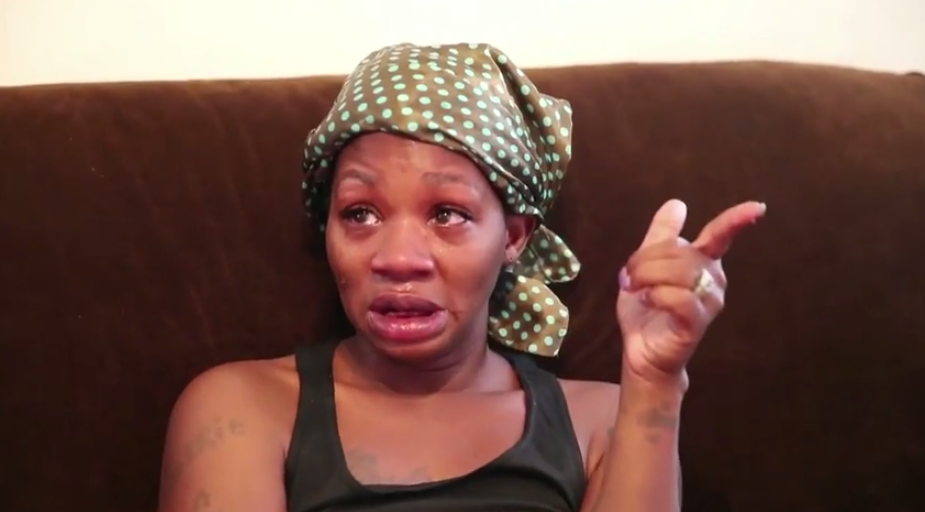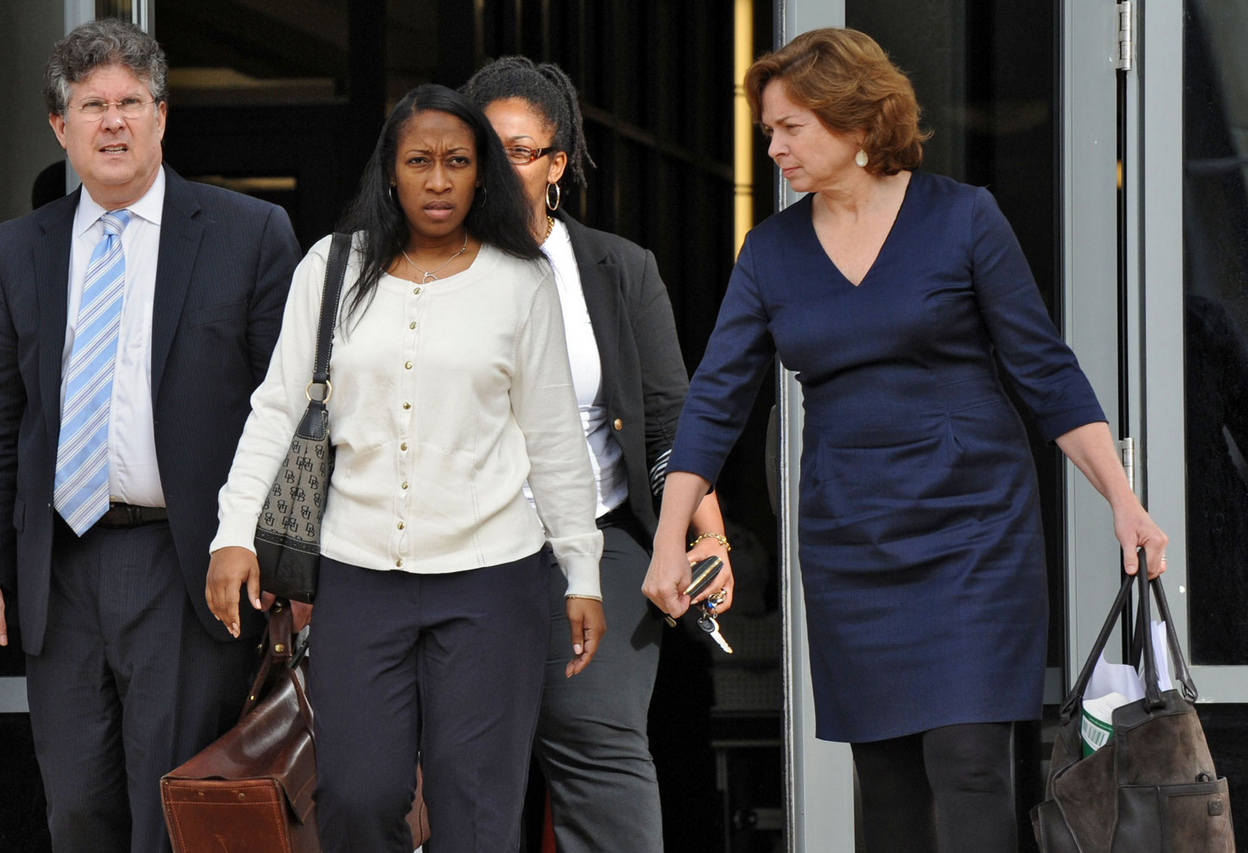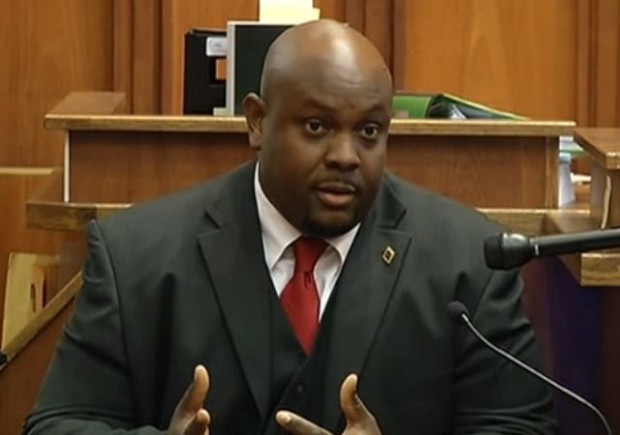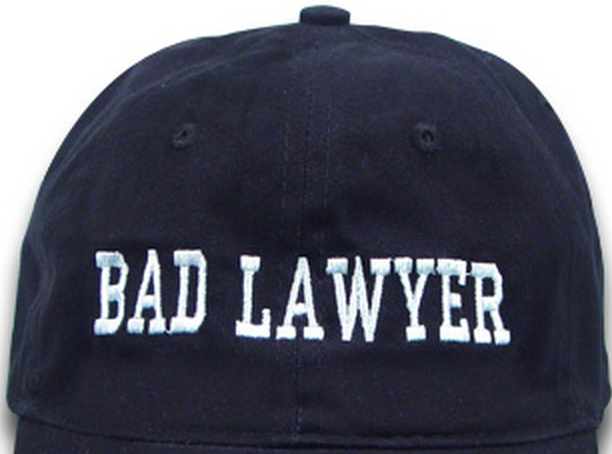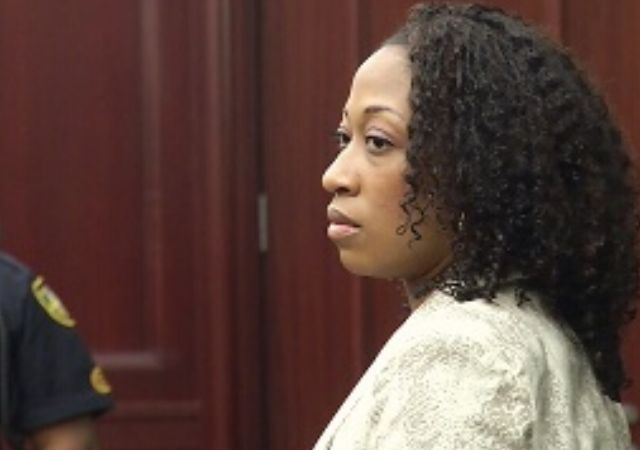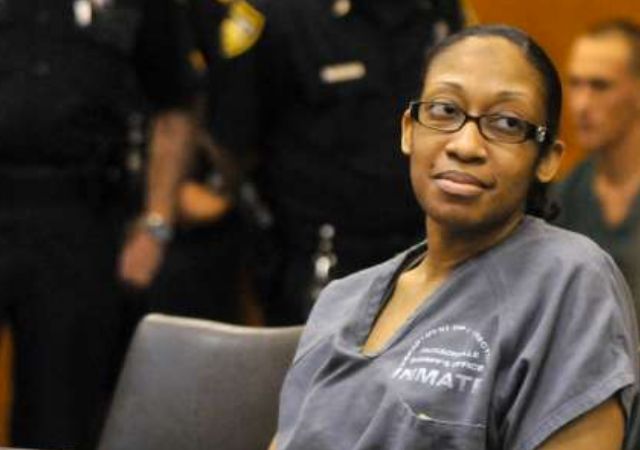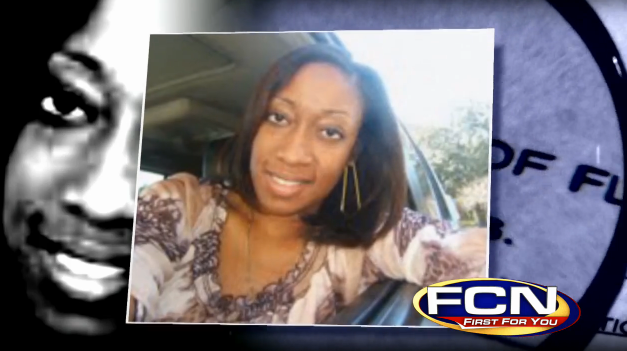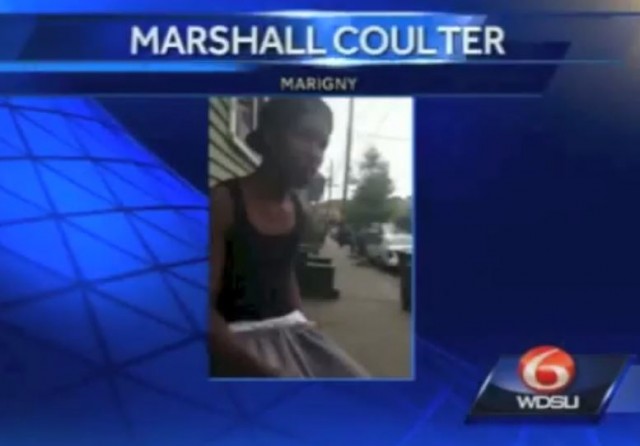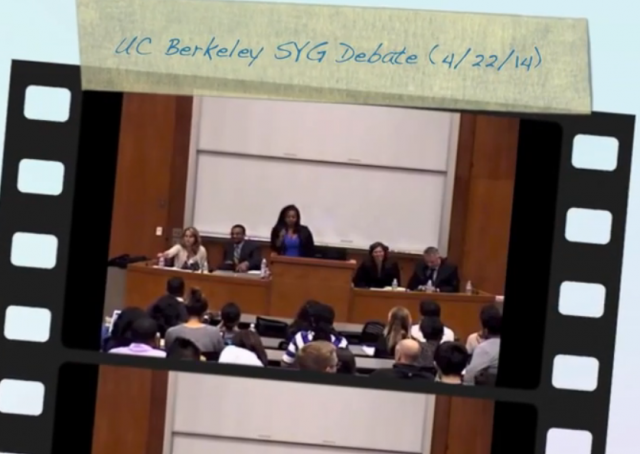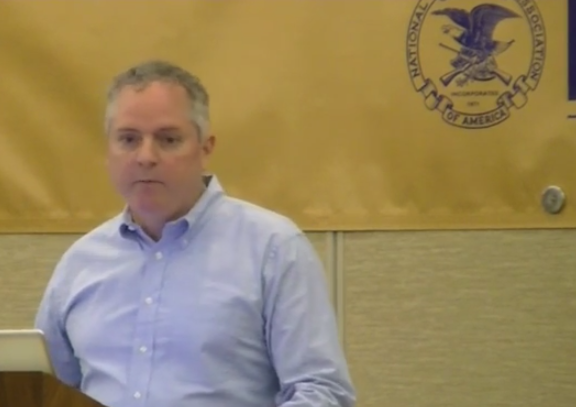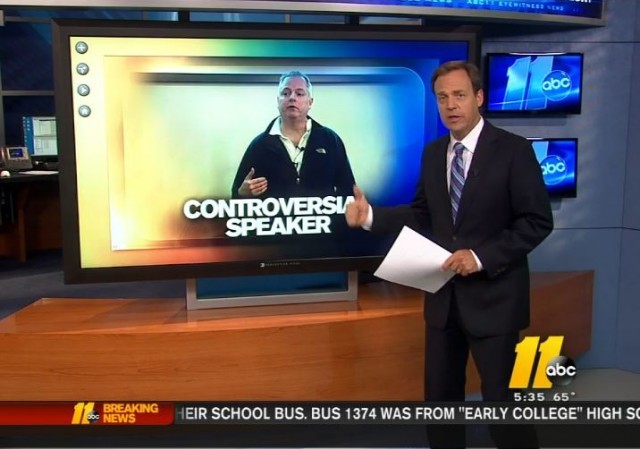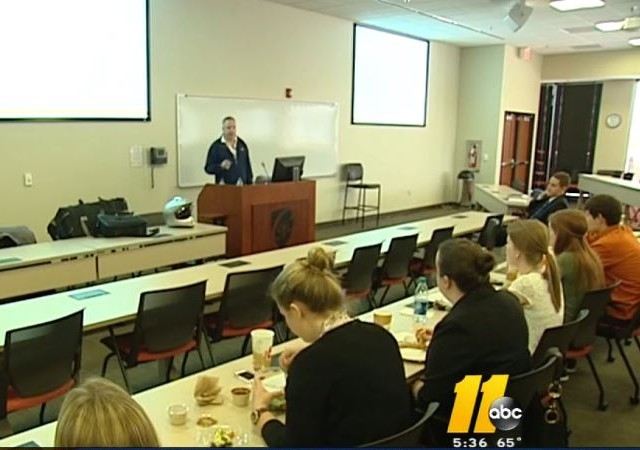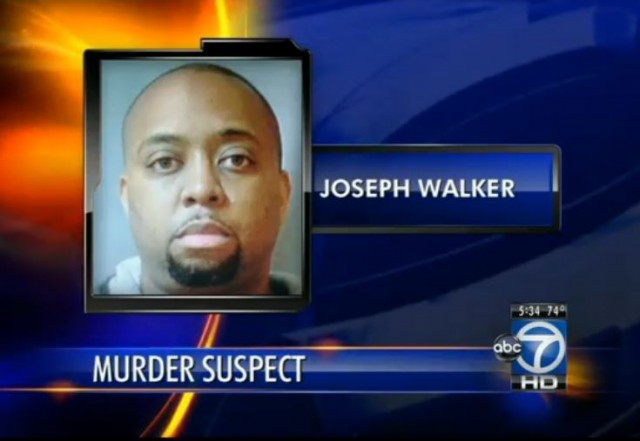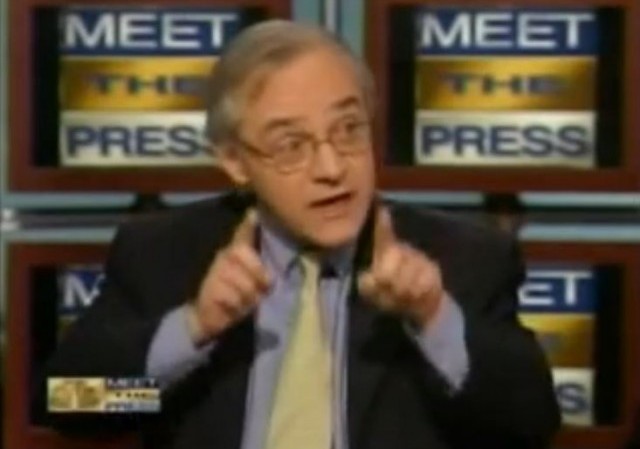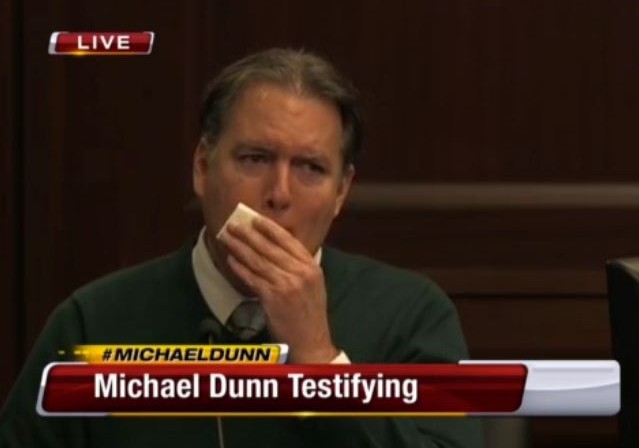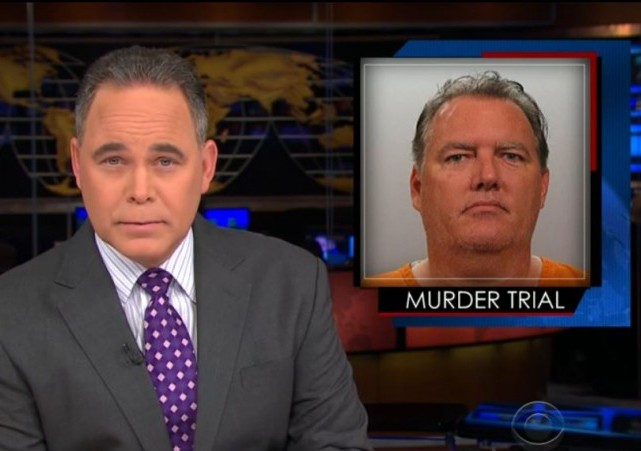Law of Self Defense Tag
No Second Self-Defense Immunity Hearing for Marissa Alexander
Florida prosecutors fail in effort to deny self-defense immunity to black male shooter
The evening of February 27, 2008, in the Miami area, Gabriel Mobley and a friend were viciously attacked by two men. Using his licensed concealed carry pistol, Mr. Mobley successfully fought off the attack, killing both of the aggressors. He was charged with two counts of second degree murder – murder which, under Florida law, requires “malice”.
How bad can a lawyer be and still be deemed “effective”? Pretty bad
Just how bad a lawyer can be and still be deemed by the courts to have provided "effective counsel"?
We all have a Constitutional right to legal representation, and further we have the right that such representation be “effective.” If a lawyer is bad enough, a guilty verdict may be overturned on the basis of “ineffective assistance of counsel.” Many people, however, don’t really understand just how bad a lawyer can be, and still be deemed to have been “effective.” In the recently decided case of Hines v. State, 2014 Tenn. Crim. App. LEXIS 376 (TN Ct. App. 2014) we see that the answer is apparently, pretty darn bad.Marissa Alexander’s Desperate Efforts for Self-Defense Immunity Hearing Delayed Again
The Issues Prompting Judge Daniel's Delay on Self-Defense Immunity Decision
As reported at First Coast News and other news media, Judge Daniel appears to be struggling with two issues in particular. The first is whether a defendant should ever be permitted to have multiple self-defense immunity hearings. The concern here is that defendants will simply seek successive self-defense immunity hearings every time an earlier one goes against them, resulting in long delays in trial. On this point the defense, in the person of high-profile litigator Faith Gay, is arguing that they have new evidence--notably, the changed testimony of one of the minor children at which Alexander fired her bullet, who they say is now prepared to testify that their father charged Alexander and thus justified her use of deadly force in self-defense. Of course, this new evidence, even if true, does nothing to change the fact that Alexander had achieved a position of safety, armed herself with a firearm, and returned to the conflict, behavior utterly inconsistent with any reasonable claim of self-defense.Upcoming Florida Sup Ct ruling on 10-20-Life sentences may seal Marissa Alexander’s fate
Decison on mandatory consecutive sentences will determine whether Marissa Alexander faces 60-plus year sentence on re-trial...
Will Marissa Alexander get second shot at Self-Defense Immunity?
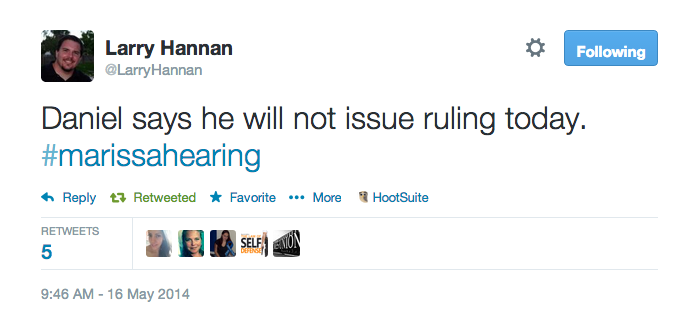
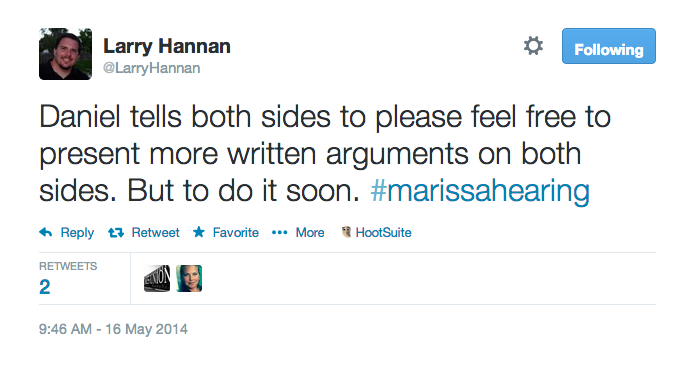 Instead, Judge James Daniel elected to schedule still another pre-trial hearing on whether Marissa Alexander should be permitted yet another pre-trial self-defense immunity hearing, this one being scheduled for June 10, at 10:00AM. Daniel’s apparent uncertainty about how he would rule was apparently all but palpable in the court room.
Instead, Judge James Daniel elected to schedule still another pre-trial hearing on whether Marissa Alexander should be permitted yet another pre-trial self-defense immunity hearing, this one being scheduled for June 10, at 10:00AM. Daniel’s apparent uncertainty about how he would rule was apparently all but palpable in the court room.
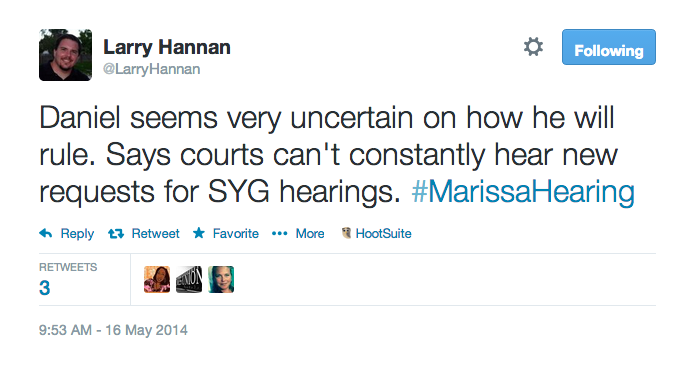 On the plus side, Judge Daniel did suggest that at the June 10 meeting to decide whether to have a second self-defense immunity hearing, if the decision was in the affirmative the would likely hold that self-defense immunity hearing that same day.
On the plus side, Judge Daniel did suggest that at the June 10 meeting to decide whether to have a second self-defense immunity hearing, if the decision was in the affirmative the would likely hold that self-defense immunity hearing that same day.
Teenage burglar in high-profile New Orleans self-defense case burglarizes again
15-year-old Marshall Coulter, previously shot by Merritt Landry, apparently so eager to resume burglary that not even bullet through head was disincentive....
Ambush and execution is not “self-defense”
Wikipedia Edit War over CNN legal analyst failure to pay Zimmerman debate wager
Andrew Branca’s “Stand-Your-Ground” Talk at the NRA Annual Meeting
CNN analyst welches on bet after Andrew Branca wins “Stand-Your-Ground” Debate
Want proof they won’t stop with your guns? Here it is
The video is highly deceptive, and nothing more than a continuation of the propaganda campaign about the case. Had they felt any affinity for the truth, they might have mentioned Martin’s emerging from the darkness to fell Zimmerman with a blow the neighborhood watch volunteer never saw coming, a blow that hit with such force that it broke Zimmerman’s nose, and which he described to police that same night as feeling as if he had been hit by a brick. Had they felt any affinity for the truth, they might have mentioned Zimmerman’s many and numerous injuries about the head and face, especially those caused by Martin striking Zimmerman’s head on a cement sidewalk, with any single blow capable of being the one that turned Zimmerman into a drooling vegetable or simply taking his life. Had they felt any affinity for the truth, they might have mentioned Martin’s long record of school violence, his engagement in street fighting, his apparent drug use, his apparent gun dealing, and his self-expressed desire to beat his victims until they had suffered “enough”. Had they felt any affinity for the truth, they might have mentioned Zimmerman’s long history of affectionate and communal relationship with black neighbors throughout his life, from his childhood to the present day, or indeed Zimmerman’s own mixed-race background. The Coalition to Stop Gun Violence tried for decades, under various guises and name changes, to seize the guns of law-abiding citizens. They failed. They tried to limit the right of the citizenry to carry arms for personal protection, they failed. By demanding a legal duty to retreat from a felonious attacker they weaken the position of the law-abiding armed citizen who sought no fight and strengthen the hand of the felony criminal who possessed all the power to choose when, where, and how to launch his vicious attack, robbery, or rape of his intended victim.
Coalition to Stop Gun Violence objects to Andrew Branca speaking at Campbell U Law School (Update – UC Berkeley too)
Nationally renowned self-defense expert Andrew Branca will speak at Campbell Law School next Tuesday, April 8 at noon in room 105. Branca, author of “The Law of Self Defense” will speak on how self-defense has become one of the latest hot button issues in gun law politics. He will also address North Carolina’s Castle Doctrine and Stand Your Ground laws.... One of the foremost experts in the United States in self-defense law across all 50 states, Branca’s expertise has been used by the Wall Street Journal, Chicago Tribune, NPR, and numerous other media organizations, as well as many private, state, and federal agencies. A Massachusetts-based attorney, he is an adjunct instructor of the law of self-defense at the Sig Sauer Academy in Epping, New Hampshire. He regularly lectures throughout the country on self-defense and the legal consequences thereafter. “Mr. Branca is one of the leading experts nationally on self-defense and the Second Amendment,” said Campbell Law Associate Professor of Law Greg Wallace. “We are fortunate to have him joining us, and I have no doubt that it will be an engaging experience for all in attendance.”One self-described "Online tech fixer for progressive causes" tweeted:
Off-Duty Cop Road Rage Murder Trial – next big self-defense case
The shooter was black and the victim white, but there's a big legal difference from Zimmerman and Dunn: In Maryland there is a legal duty to retreat....
Breaking – E.J. Dionne unable to grasp Stand Your Ground laws
The law is supposed to solve problems, not create them. Laws should provide as much clarity as possible, not expand the realms of ambiguity and subjectivity. Laws ought to bring about the practical results their promoters claim they'll achieve.With a lead-in like that, surely he's about to call for the repeal of the Affordable Care Act, right? Just kidding--it is, after all, the Washington Post. Instead, Dionne has decided to call for the repeal of another law about which he patently knows nothing: "Stand-Your-Ground."
Dionne's Imagined Relevance of Stand-Your-Ground to Dunn Trial
How can we identify his ignorance of the law he argues should be repealed, as well as its application (or, more accurately, its lack of application) in the Zimmerman and Dunn trials. Why, he's kind enough to show us, in his own words. First, Dionne writes of the Dunn trial:Supporters of the law say it was technically not at issue in the case, but this overlooks the obvious role it played in the trial.And where do we find this "obvious role" for SYG in the Dunn trial? It was mentioned in a single passing sentence--that would be ONE sentence--with no particular emphasis by defense counsel Cory Strolla in his closing argument. One mention over the course of two weeks of jury voir dire opening statements, day after day of trial, and closing arguments. One. Mention.
Stand Your Ground law is not a “license to kill”
Law Professor pundits confuse general principles of self-defense law with Stand Your Ground, and contribute to the confusion....
Reader “Stand Your Ground” Pop Quiz
Is this really "the highest profile stand your ground case in Florida since George Zimmerman"?...
Donations tax deductible
to the full extent allowed by law.
CONTRIBUTORS
- William A. Jacobson
Founder
- Kemberlee Kaye
Sr. Contrib Editor
- Mary Chastain
Contrib Editor
- Fuzzy Slippers
Weekend Editor
- Mike LaChance
Higher Ed
- Leslie Eastman
Author
- Vijeta Uniyal
Author
- Stacey Matthews
Author
- Jane Coleman
Author
- James Nault
Author
- Mandy Nagy
Editor Emerita
- Learn more about the Contributors

